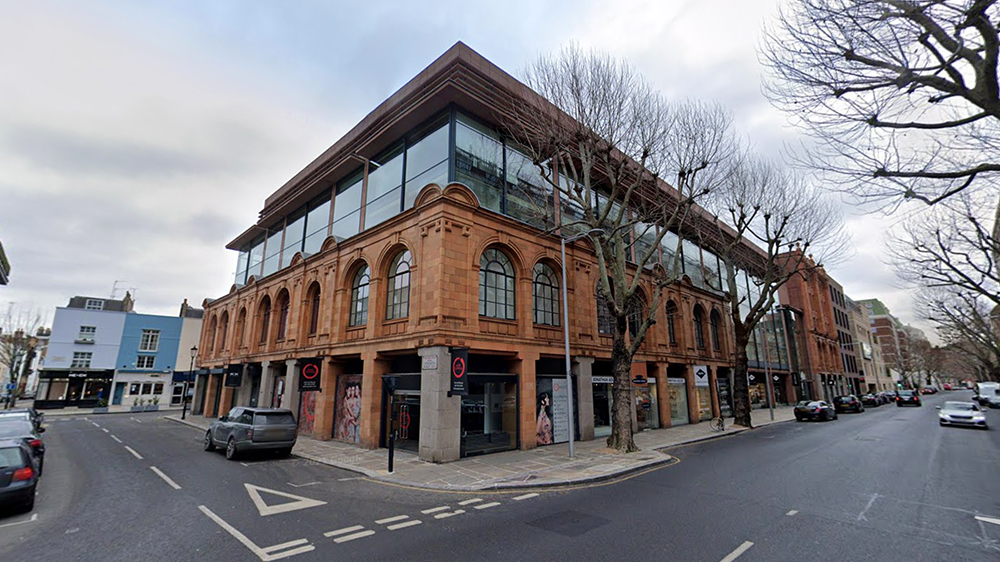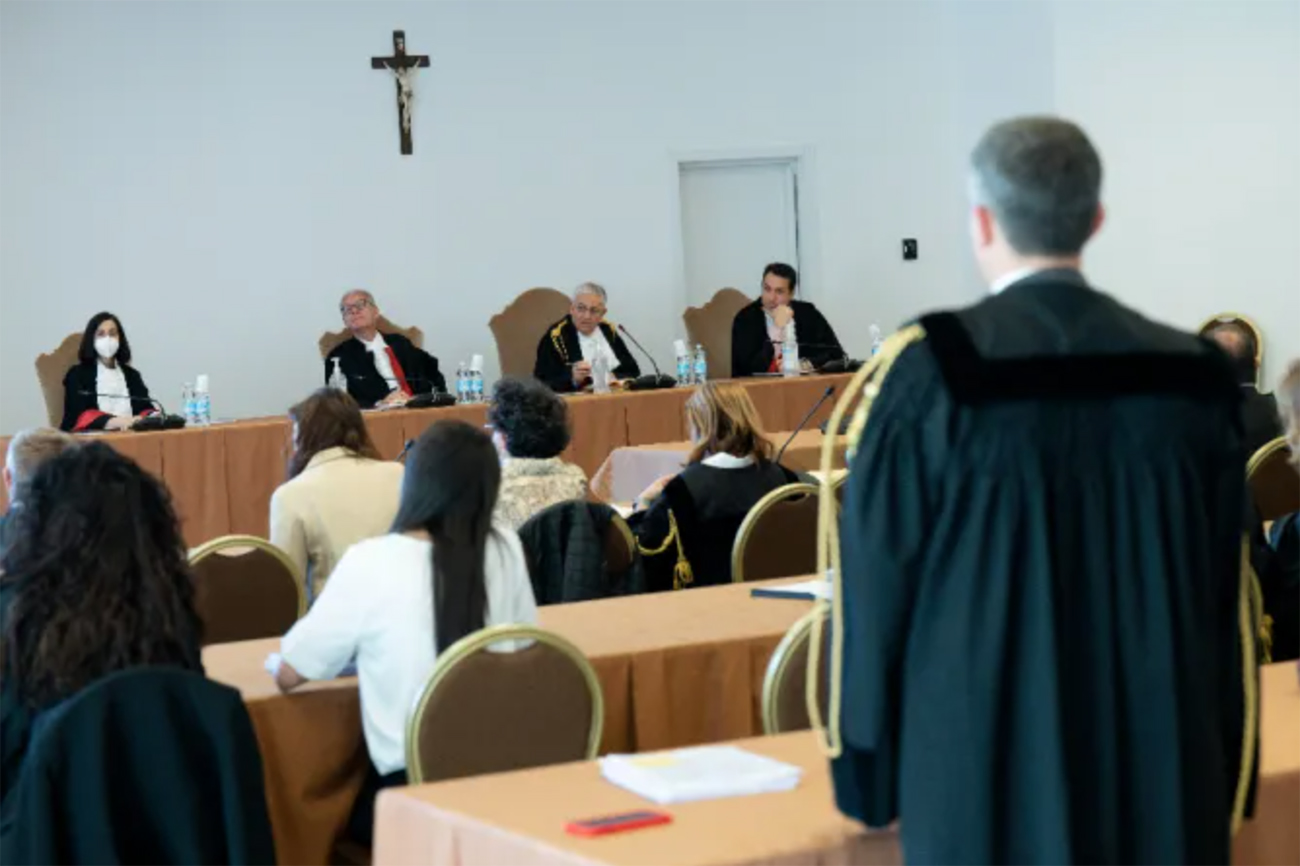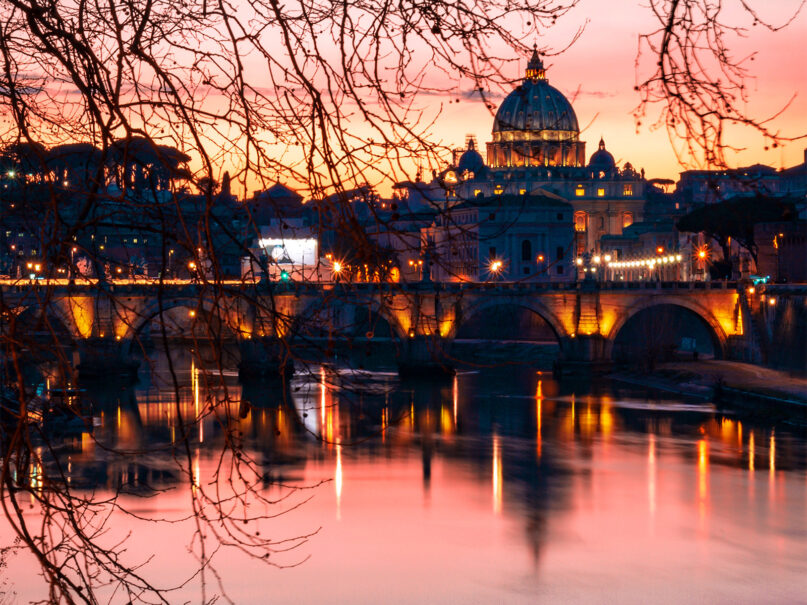VATICAN CITY (RNS) — Over a year into the proceedings, the Vatican mega-trial of 10 individuals accused of defrauding the Catholic institution’s finances through a controversial real estate deal began again this week after a summer recess with an interrogation of the prosecution’s witnesses.
The trial, which resumed Wednesday (Sept. 28) after being on break since July, revolves around a 2018 London real estate purchase by the Vatican’s Secretariat of State that ultimately cost the institution well over $200 million, mainly taken from papal funds destined for charity.
After more than a year of hearing from defendants, including Cardinal Angelo Becciu, judges will now be presented with testimony from the Vatican prosecutor’s submitted list of 27 witnesses.
On Friday, Revisor General Alessandro Cassinis Righini described to judges a culture of mismanagement within the Vatican’s Secretariat of State. Righini was appointed to oversee Vatican budgets and transactions by Pope Francis in March 2021 but had already been fulfilling that role since 2017, when his predecessor, Libero Milone, was accused by Becciu and Vatican gendarmes of spying on Vatican employees.
Righini painted a bleak picture of the Secretariat of State to the Vatican judges, also detailing his experience as an assistant to Milone in 2015. He described a “lack of competence” within the large department, which, he said, failed to implement due diligence and transparency.
In 2018, Pope Francis asked Righini to review the finances of the Secretariat as Archbishop Edgar Peña Parra took over the role of substitute, the Vatican equivalent of chief of staff, from Becciu. Righini told judges that the Secretariat adopted a position of “clear resistance” to any form of financial oversight.
“We are used to controlling, not to being controlled,” Becciu, who managed the Secretariat from 2011 to 2018, told Vatican financial revisors according to Righini.
Pope Francis stripped the Secretariat of its financial portfolio and assets in December 2020.
When the revisor began investigating the department’s portfolio, he said he found 928 million euro deposited in a Credit Suisse account and invested “in highly speculative products.” Righini said that to his knowledge Pope Francis was not aware of the money.
In 2018, the Vatican revisors also found “strange” transactions tied to the London property, which would eventually lead the Institute for Religious Works, also known as the Vatican Bank, to flag the deal to Vatican police.

The London property at the heart of the Vatican financial scandal. Image via Google Maps
According to Righini, the funds used in the London real estate deal were “difficult to evaluate,” overrun with fees and commissions, and hard to trace back to the original owners.
“It was obvious that it wasn’t the appropriate way to manage the money derived from Peter’s Pence,” Righini said, referring to the fund comprising of donations made by faithful to the Vatican, which he confirmed was used for the London real estate investment.
Becciu’s legal defense underscored that there were no clear moral and ethical guidelines for investments before Pope Francis’ reforms last July. Becciu, who had been stripped of his cardinal rights following the financial scandal, was partly redeemed over the summer when Pope Francis allowed him to participate at a cardinal summit in Rome in August.
While the revisor said he was told that Becciu and his successor, Parra, were aware of the financial transactions, he said that he mostly interacted with the Secretariat’s financial official, Fabrizio Tirabassi, and the department’s top deputy Monsignor Alberto Perlasca. “They didn’t strike me as clever and well-versed financiers,” Righini said.
Tirabassi, who managed the Secretariat’s investments, is charged with corruption, extortion, embezzlement, fraud and abuse of office. During his final interrogation on Wednesday (Sept. 28), Tirabassi was asked by prosecutors about 1.3 million euro deposited in a Swiss Bank under his name. Vatican police also found more than 2 million euro stashed in the official’s apartment in boxes and ancient coins.
Perlasca, who was initially a chief suspect in the London real estate deal, is now a star witness for the prosecutors in the trial. He will be called to testify in court in the coming months, judges said. According to Righini’s testimony, Perlasca told him that “the less is written in the balance sheets, the better.”

Proceedings in the Vatican finance trial on May 20, 2022. Photo by Vatican Media
RELATED: Following papal reforms, Vatican departments are ready to help local bishops
On Thursday and Friday, prosecutors and defense lawyers cross-examined witness Roberto Lolato, who worked as an adviser for the prosecution in determining the property value and financial dealings surrounding the London real estate. Before collaborating with Vatican prosecutors, Lolato worked as an adviser of the Vatican’s Revisor General and participated in a commission that studied the funds of the Secretariat of State between 2018 and 2019.
Lolato answered questions surrounding the accuracy of the evaluation of the price of the London real estate, taking into account the significant loan taken out by financier Raffaele Mincione when he purchased the property, as well as any potential earnings. Mincione, whose fund the Vatican invested in, is among the defendants in the trial and has declared his innocence from the accusations of fraud and embezzlement before judges.
Lawyer Nicola Squillace, charged with fraud, embezzlement and money laundering, also spoke to the judges on Thursday, detailing his role in drafting the 2018 Vatican deal giving Italian entrepreneur Gianluigi Torzi the final say on the property. Torzi is accused of extortion, embezzlement, fraud and money laundering but has refused to testify at the Vatican court.
Squillace’s testimony highlighted the role of other middlemen who have been notably absent from the proceedings. Fund manager Alessandro Noceti, financial consultant Nicola Dal Fabbro, and businessman Giuseppe Milanese have become household names at the trial but are not listed as witnesses or charged with any crime.
Squillace testified that the architect Luciano Capaldo played a key role in drafting the document that handed voting shares of the fund owning the property to Torzi and also confirmed that Torzi essentially managed the London real estate in 2019.
“We can’t wait to ask the architect Capaldo many questions,” said Torzi’s lawyer during the hearing on Friday. Capaldo has been called to testify in court in the coming weeks.
Vatican prosecutors said they intend to present a more complete list of witnesses to the judges, which will likely draw out the already lengthy and complicated trial. It is not known whether Parra and Vatican Secretary of State Cardinal Pietro Parolin will testify in court, given their insider role and knowledge of the deal.
RELATED: Synod on Synodality had its doubters, but it’s proving to be balm for ‘enduring wounds’





